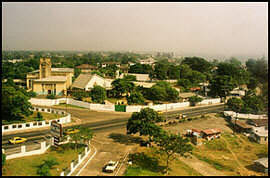 FOREIGN AFFAIRS FOREIGN AFFAIRS |
Liberia has always been a potent force in international relations, being a founding member of almost every major international body concerned with peaceful co-existence, global development and cooperation.

Liberia was a founding member of the League of Nations that preceded the United Nations, which founding Charter Liberia signed in 1945 in San Francisco to give birth to the global body now overseeing global peace and development.
On the African continent, this West African nation spearheaded the fight against colonialism at the height of the liberation struggle for self-rule and self-determination among African countries colonized by other countries.
In July 1959, three West African leaders - Sekou Toure of Guinea, Kwame Nkrumah of Ghana and William Tubman of Liberia - gathered in the northern city of Sanniquellie where the idea of an organization of African states was hatched.
The following year, a number of African Heads of State gathered and founded the Organization of African Unity (OAU), which today provides a forum for leaders of the continent to dialogue on the problems and future of the continent.
But during the heydays of the liberation struggle, Liberia provided both moral and financial support to the "freedom fighters" such as Nelson Mandela and Sam Nujoma as well as renowned musicians like Mariam Makeba and Hugh Masekela who were fleeing persecution at the hands of apartheid South Africa.
Many such persons enjoyed Liberian citizenship and sanctuary as "the struggle continued."
Liberia and Ethiopia filed a joint legal suit at the International Court of Justice in The Hague against apartheid South Africa over its occupancy of the South West Africa territory, now Namibia, which was then under United Nations Trusteeship.
Liberia also sent peacekeeping troops to the Congo in the early 1960s when that country was saddled with conflict.
Liberia's international political posture, coupled with its economic stature at the time, earned it the accolade "a beacon of hope" for Africa and Africans.
Today, Liberia stands accused of aiding and abetting the rebel war in neighboring Sierra Leone, charges the Liberian government vehemently denies and challenges its accusers to present evidence of negative links to the rebels.
Britain, a former colonial master of Sierra Leone, and the United States are leading a campaign at the United Nations Security Council for the imposition of sanctions against the West African nation for its alleged role in gunrunning and diamond smuggling with the rebels. | Liberia insists its connections with the rebels were made with the acquiescence of the United Nations and the Economic Community of West African States (ECOWAS) that have been brokering peace in Sierra Leone's decade-old war.
Distancing itself from the Sierra Leonean rebels called the Revolutionary United Front (RUF), the Liberian government expelled all RUF men from its territory and closed down a liaison office that the RUF ran in Monrovia as a contact point for international bodies brokering peace in the war.
Several overtures by the Liberian government to clearly define its role in the sub-region have been made, prompting the ECOWAS to call on the UN Security Council to shelve the imposition of sanction for two months, a request the United Nations has heeded.
"We have made so many proposals to the UN to resolve questions that they have raised. We have called for the deployment of international troops to monitor our border, the posting of observers at our international airport…monitoring the diamonds that leave here. They have rejected them," states Foreign Minister, Mr. Monie Captan.
Minister Captan believes these propositions were enough to exonerate Liberia from the charges levied by the certain foreign powers to the United Nations.
The Liberian Foreign Minister says the UN panel of experts report raises a lot of doubts, because it did not answer many questions, including the charge that Liberia sold over 100million USD worth of diamonds.
"How can you sell 100millionUSD diamonds and there is no money trail? Can you go to Antwerp in the heart of Europe and sell (that) worth of diamond and no one can show you any financial records, transactions, bank transfers? I don't think they (UN panel) have done an adequate job," Mr. Captan insists.
Liberia is a founding member of the ECOWAS, a sub-regional economic grouping of some 16 West African Franco-phone and Anglophone states founded in the 1970s to foster economic integration through a common market, currency, travel documentation to enhance free movement.
Liberia also led the way into the formation of the Mano River Union, another economic grouping, comprising Sierra Leone, Guinea and Liberia, all of which share a common border, cultural heritage and consanguinity.
Political and diplomatic differences have kept Liberia and her "traditional ally", the United States, at a little distance away, but Liberian government officials have vowed to explore every available means to heighten the level of collaboration and cooperation between Monrovia and Washington.
The founding fathers of Liberia are ex-slaves from plantations in South America who were brought to these shores by the American Colonization Society empowered by the US government back in the early 1820s to resettle freed black slaves.
Today, that historical lineage and the numerous economic and political interactions of the two states have left an indelible mark called a "special friendship" subsisting between the two countries that have spanned over a century and a half. |

